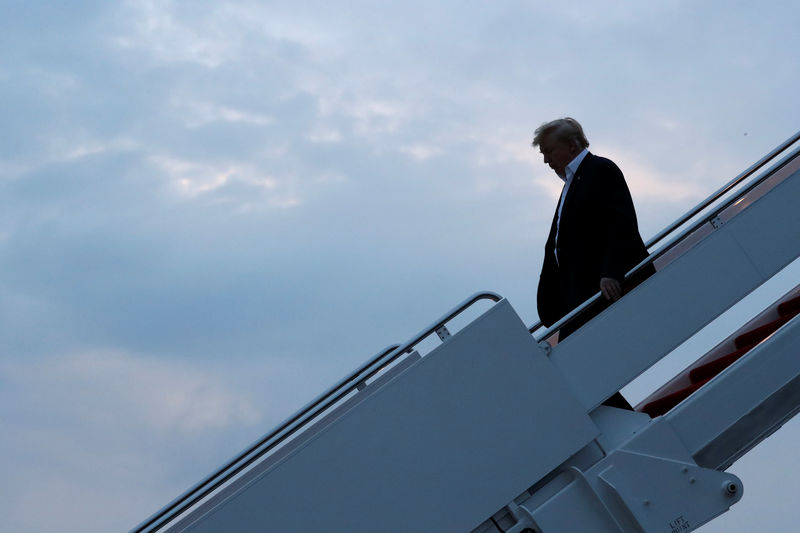 © Reuters. U.S. President Trump arrives aboard Air Force One from Singapore at Joint Base Andrews
© Reuters. U.S. President Trump arrives aboard Air Force One from Singapore at Joint Base AndrewsBy Lindsay Dunsmuir
WASHINGTON (Reuters) – The International Monetary Fund warned on Thursday that U.S. President Donald Trump’s new import tariffs threaten to undermine the global trading system, prompt retaliatory responses from other countries and damage the U.S. economy.
The IMF, in a review of U.S. economic policy, also said that while the country’s economic growth is expected to be strong this year and next, recent tax and spending measures could cause greater risks from 2020 onwards.
Trump has riled key allies by pursuing protectionist trade policies, including the imposition of steel and aluminum tariffs on the European Union, Canada and Mexico.
“These measures…are likely to move the globe further away from an open, fair and rules-based trade system, with adverse effects for both the U.S. economy and for trading partners,” the IMF said in its report.
Trump stunned his counterparts by backing out of a joint communique agreed by Group of Seven leaders in Canada last weekend that mentioned the importance of free, fair and mutually beneficial trade.
German Chancellor Angela Merkel has said the EU would implement counter-measures against U.S. tariffs, as did Canada and Mexico.
The IMF said a cycle of retaliation on trade would likely dampen national and international investment, interrupt global and regional supply chains and undermine a system that has supported U.S. growth and job creation.
“The U.S. and its trading partners should work…to reduce trade barriers and resolve trade and investment disagreements without resorting to tariff and non-tariff barriers,” the IMF said.
It added that targeting specific levels on bilateral trade balances was counterproductive.
The Trump administration’s trade dispute with China has also yet to be resolved. The United States is expected on Friday to unveil revisions to an initial tariff list targeting $50 billion of Chinese goods.
China urged Washington on Thursday to make a “wise decision” on trade, saying it was ready to respond in case Washington chose confrontation.
Elsewhere in its analysis, the Washington-based international lender stuck to its April forecast that the U.S. economy will grow at a 2.9 percent pace in 2018 and 2.7 percent in 2019.
The U.S. economy is being juiced by the administration’s $1.5 trillion package of corporate and income tax cuts as well has higher government spending.
In line with the U.S. Federal Reserve, the IMF expects growth to slow considerably in 2020. It forecasts the annual pace of growth falling back to 1.9 percent.
It noted that the U.S. government’s tax and spending policies during a time when the economy is already experiencing strong growth and low unemployment “increases the range and size of future risks” including higher public debt and greater likelihood of recession.
“The output gap could close more abruptly, through a policy-induced recession, with negative spillovers for the global economy,” the IMF said.
The IMF also expressed concern about the growing market power of some of the largest U.S. “superstar” corporations and said that there was a “clear role” for applying antitrust policies or increased regulation.
It did not name any firms, but IMF officials in the past have cited concerns with the market concentration wielded by large technology firms such as Alphabet Inc’s Google (O:), Amazon.com Inc (O:) Apple Inc (O:) and Facebook (O:).
The IMF said the United States needed to combat price discrimination, supply restrictions or predatory pricing that could arise from increased market concentration, and should fairly tax “supernormal” profits resulting from such power.
“It may also sometimes be appropriate for the entity providing the service to be regulated,” the IMF said.
Source: Investing.com


























